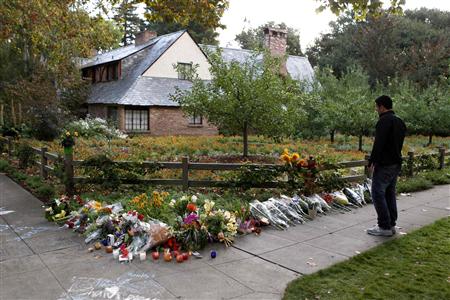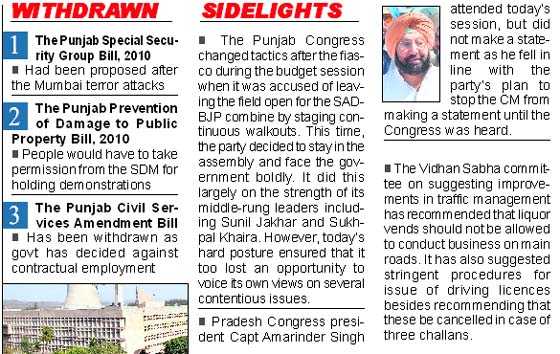CUPERTINO, Calif./SAN FRANCISCO (Reuters) - Steve Jobs, in pain and too weak to climb stairs a few weeks before his death, wanted his children to understand why he wasn't always there for them, according to the author of his highly anticipated biography.
"I wanted my kids to know me," Jobs was quoted as saying by Pulitzer Prize nominee Walter Isaacson, when he asked the Apple Inc co-founder why he authorized a tell-all biography after living a private, almost ascetic life.
"I wasn't always there for them, and I wanted them to know why and to understand what I did," Jobs told Isaacson in their final interview at Jobs' home in Palo Alto, California.
Isaacson said he visited Jobs for the last time a few weeks ago and found him curled up in some pain in a downstairs bedroom. Jobs had moved there because he was too weak to go up and down stairs, "but his mind was still sharp and his humor vibrant," Isaacson wrote in an essay on Time.com that will be published in the magazine's October 17 edition.
Jobs died on Wednesday at the age of 56 after a long battle with a rare form of pancreatic cancer.
Outpourings of sympathy swept across the globe as state leaders, business rivals and fans paid respect to the man who touched the daily lives of countless millions through the Macintosh computer, iPod, iPhone and iPad.
Jobs had struggled with health issues but said very little about his battle with cancer since an operation in 2004. When he stepped down in August, handing the CEO reins to long-time operations chief Tim Cook, Jobs said simply that he could no longer fulfill his duties as chief executive.
Apple has been similarly guarded about the circumstances of his death, saying only that their chairman was surrounded by his wife Laurene and immediate family. Jobs had four children from two relationships.
Funeral arrangements have not been disclosed and it is uncertain when the company will hold a planned "celebration" of Jobs' life. Officials in Sacramento said there will be no state or public funeral.
SOMBER MOOD
From Tokyo and Paris to San Francisco and New York, mourners created impromptu memorials outside Apple stores, from flowers and candles to a dozen green and red apples on Manhattan's Fifth Avenue.
At corporate headquarters in the heart of Silicon Valley on Thursday, employees -- current and former -- gathered with their families under an overcast sky to pay their respects at a makeshift memorial on a driveway leading up to the entrance.
"He was a very private person, but he's everywhere in the products he created," said Glenn Harada, a 22-year-old former Apple employee. "He didn't work alone but none of this could have happened without him."
Employees said they went on with business, but with an undercurrent of sadness. Grief counselors on the payroll had reached out to Apple workers, a spokesman said.
"Deep down there's sadness," said Cory Moll, a part-time Apple employee who had tried to organize a union. "We have lost someone who touched us all."
With his passion for minimalist design and a genius for marketing, Jobs laid the groundwork for Apple to continue to flourish after his death, most analysts and investors say.
But Apple still faces challenges in the absence of the man who was its chief product designer, marketing guru and salesman nonpareil. Phones running Google's Android software are gaining share in the smartphone market, and there are questions about what Apple's next big product will be.
The launch of the iPhone 4S -- at the kind of gala event that became Jobs' trademark -- was a letdown to many fans earlier this week, underscoring how Jobs' showmanship and uncanny instincts will be missed.
But Wall Street analysts said Cook's new team-based approach and operational savvy will keep the company on track -- at least for now.
Apple shares ended down just 0.23 percent at $377.37, though that underperformed the broader U.S. market.
"It didn't come as a shock," said Terry Donoghue, an Apple technical writer, whose department boss called an hour-long meeting to reminisce about Jobs. "It's still hard for a lot of people."
JOBS' ESTATE: CONFIDENTIAL?
Jobs, in his trademark uniform of black mock-turtleneck and blue jeans, was deemed the heart and soul of a company that rivals Exxon Mobil as the most valuable in America.
With an estimated net worth of $7 billion -- including a 7 percent stake in Walt Disney Co -- it was not known how Jobs' estate would be handled.
The entrepreneur had sometimes been criticized for not wielding his enormous influence and wealth for philanthropy like Warren Buffett and Bill Gates. His death revived speculation that some of his estate might be donated to cancer research groups or hospitals.
California law requires a will to be filed in probate court within 30 days of death.
Jobs and his wife placed at least three properties into trusts in 2009, which legal experts say is a sign he may have been preparing his assets to remain confidential upon his death.
Placing stock and real estate into trusts can both minimize estate taxes upon a person's death, and keep them from being publicly disclosed in probate court, said John O'Grady, a trusts and estates attorney in San Francisco.
Jobs was given up for adoption soon after his birth in San Francisco to an American mother, Joanne Carole Schieble, and a Syrian-born father, Abdulfattah "John" Jandali.
A college dropout, Jobs started Apple Computer with friend Steve Wozniak in his parents' garage in 1976.
"I do feel like I did when John Lennon was killed. Also JFK and Martin Luther King. Like Steve Jobs, they gave us hope," Wozniak said on his Facebook page.
Jobs changed the technology world in the late 1970s, when the Apple II became the first personal computer to gain a wide following. He did it again in 1984 with the Macintosh, which built on breakthrough technologies developed at Xerox Parc and elsewhere to create the personal computing experience as we know it today.
The rebel streak that was central to his persona got him tossed out of Apple in 1985, but he returned in 1997 and after a few years began the roll-out of a troika of products -- the iPod, the iPhone and the iPad -- that again upended the established order in major industries.
 According to the environmentalists, non-biodegradable plastic carry bags pollute the environment and must be banned.
According to the environmentalists, non-biodegradable plastic carry bags pollute the environment and must be banned.






